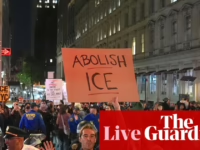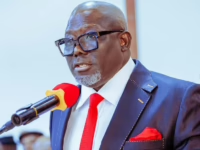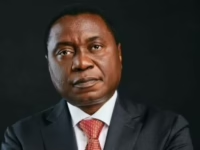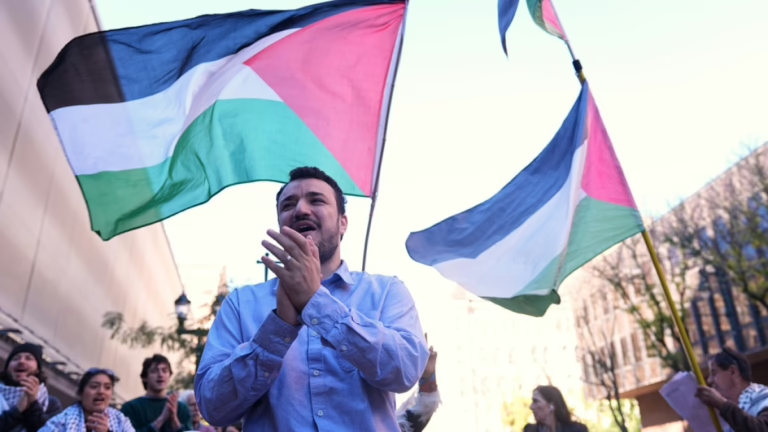Facing deportation for his involvement in pro-Palestine demonstrations at Columbia University, Khalil describes his situation as a pivotal moment for civil liberties.
Attorneys representing Mahmoud Khalil have petitioned appellate judges in the United States to uphold a previous court ruling that secured his release from immigration detention.
Khalil, a Palestine solidarity advocate targeted by the US government due to his activism at Columbia University last year, addressed supporters outside the Philadelphia courthouse following Tuesday’s hearing, emphasizing that his case serves as a “crucial test for everyone’s rights.”
He expressed confidence that there is currently “no immediate threat” of being detained again.
“No one should be discouraged from advocating for Palestinian freedom or defending immigrant rights everywhere,” Khalil affirmed.
Government attorneys are urging a three-judge panel on the appellate court to overturn the decision that freed him, contending that the federal district court in New Jersey lacked the authority to grant his release.
Khalil, a lawful permanent resident, is the first well-known Palestinian rights activist to face detention and challenges to his immigration status linked to campus activism.
The Trump administration has claimed responsibility for targeting hundreds of students for deportation, accusing them of endorsing “terrorism” and promoting anti-Semitism-charges the activists vehemently reject.
To justify this crackdown legally, the administration has relied on an immigration statute empowering the secretary of state to deport non-citizens whose presence allegedly causes “adverse foreign policy consequences” for the United States.
Bobby Hodgson, assistant legal director at the New York branch of the American Civil Liberties Union (ACLU), stated during a virtual press conference on Tuesday that the government’s broad interpretation of deportation authority on foreign policy grounds is “incorrect” and “violates the Constitution.”
“Our core argument is that in America, expressing ideas is not a crime, and the government cannot misuse a vague immigration law to detain or expel individuals simply because it disagrees with their viewpoints,” Hodgson explained.
Khalil was taken into custody by immigration officials in March, causing him to miss the birth of his first child while held in a detention facility in Louisiana.
The June court ruling that secured Khalil’s release addressed a habeas corpus petition challenging his detention but did not resolve the broader immigration proceedings against him.
His deportation case continues separately within the immigration system.
The US government has also accused Khalil of failing to disclose his employment with the United Nations Relief and Works Agency for Palestine Refugees (UNRWA) on his visa and Green Card applications, a claim used to strengthen the deportation effort.
Last month, an immigration judge ruled in favor of the government, ordering Khalil’s removal from the country.
It is important to note that immigration judges operate under the executive branch and do not function as independent judicial authorities like constitutional courts.
Khalil’s case is now under review by the Board of Immigration Appeals, an administrative tribunal.
If the board upholds the immigration judge’s decision, the case will likely be taken to a federal circuit court, where constitutional issues will be examined.
With appeals ongoing on both the habeas corpus and immigration fronts, this legal battle is expected to extend for some time.
Meanwhile, Khalil and others in similar circumstances remain free thanks to rulings by district courts.
In a related, wider case, a US judge recently determined that the Trump administration’s efforts to suppress Palestine solidarity activists were unlawful, as they sought to stifle criticism of Israel, infringing on constitutionally protected free speech.
“We must not become a nation that imprisons or deports individuals out of fear of their messages,” Judge William Young declared in his decision.





















